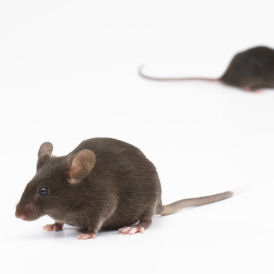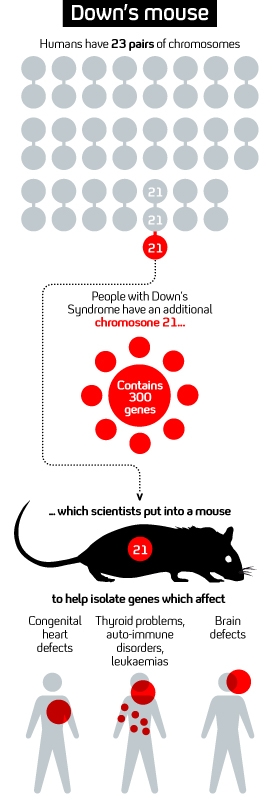Rules needed on ‘Frankenstein’ experiments
Experiments where human cells are transplanted into animals should be better regulated, a report says. Channel 4 News looks into the debate of science versus “Frankenstein’s monster” fears.

A report from the Academy of Medical Sciences into the ethics of putting human material into animals for research purposes said more regulation is needed now, before possibilities that are explored in fiction start happening in reality.
While the report stressed that experiments at the more extreme end of the scale are not happening in the UK yet, its authors said they wanted to start the conversation now so that future decisions could be taken with the support of scientists and the public.
Many scientists believe that research of this type, where human genes are implanted into animals like mice and goats, has huge potential. It has already had some notable successes like the Down’s mouse, a mouse implanted with the human chromosome linked to Down’s Syndrome which has helped scientists understand more about the condition.
While the report found that the public is generally in favour of this research, it also looked at the point at which people have ethical issues with certain experiments. People are most concerned about research which involves the modification of the animal brain to create human-like “cerebral” function – including creating animals which can speak – or fertilising human eggs or sperm in an animal.
The report said the Government should set up a national expert body and create different grades of experiment to provide guidance for scientists.
The ‘Frankenstein fear’
The report said scientists needed to take seriously what could happen in the future, and consider “the ‘Frankenstein fear’ that the medical research which creates ‘humanised’ animals is going to generate ‘monsters'”.
We all laugh when we see cartoons of talking meerkats. If we were actually doing that in the labs, I don’t think people would be so happy. Dr Robin Lovell-Badge
A member of the working group which produced the report, Dr Robin Lovell-Badge – who is a leading geneticist from the Medical Research Council’s National Institute for Medical Research – told Channel 4 News: “People are very odd. We all laugh when we see cartoons of talking meerkats or cats with opposable thumbs but they know they are not real. If we were actually doing that in the labs and they were made real, I don’t think people would be so happy.”
He added: “That’s really why we did this report because we wanted to understand people’s attitudes, and we recognise the concerns and that is why we’re proposing this extra level of regulation at the point where people might start feeling revolted by the idea or uncomfortable. That is what is missing in regulation at the moment.”

Research where human material, including genes, is transplanted into animals is already used in many areas of medical research, such as in the battles to cure diseases like HIV and cancer. For example, scientists have implanted a human gene in goats which enables them to produce a human protein which is used to treat blood clotting disorders. They have also used mice with human liver cells to study diseases including HIV and hepatitis.
Dr Lovell-Badge said this kind of research was “extremely important” and exciting for scientists because of the potential to help them understand disease as well as how genes work, how the fundamental differences between human and animal behaviour.
Recommendations
But Professor Martin Bobrow, the chair of the working group, said experiments did need to be classified so that scientists breaking new ground were clearer over what was acceptable. He also said this kind of research should be supervised by a national expert body.
He said: “The very great majority of experiments present no issues beyond the general use of animals in research and these should proceed under current regulation.
“A limited number of experiments should be permissible subject to scrutiny by the expert body we recommend; and a very limited range should not be undertaken, at least until the potential consequences are more fully understood.”
All animal testing in the UK is currently regulated by the Home Office, through the Animal Procedures Committee, and the Government said it would consider the report’s recommendations.
-
Latest news
-
As India goes to the polls in the world’s largest election – what do British-Indians think?6m

-
Tees Valley: Meet the candidates in one of the biggest contests coming up in May’s local elections4m

-
Keir Starmer says public sector reform will be a struggle7m

-
Nicola Sturgeon’s husband Peter Murrell charged with embezzlement of funds from SNP1m

-
Ukraine might finally get $60billion in American weapons and assistance to defend against Russia3m

-




